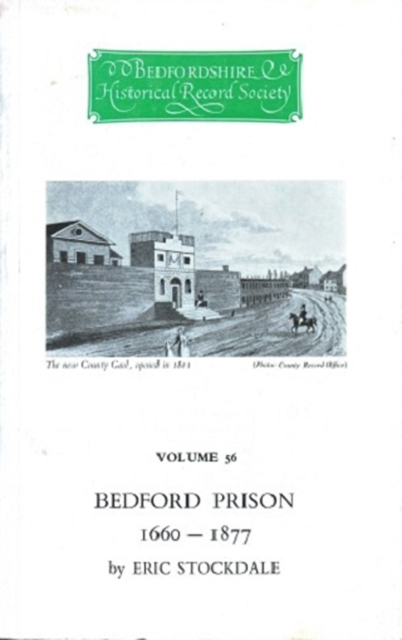Book contents
- Frontmatter
- Contents
- Acknowledgments
- Foreword
- Introduction
- Chapter 1 John Bunyan 1660-1688
- Chapter 2 Some Contemporaries of Bunyan
- Chapter 3 The Richardson-Howard Family of Jailers 1711-1814
- Chapter 4 Transportation to America Before 1776
- Chapter 5 John Howard 1773-1790
- Chapter 6 Samuel Whitbread 1790-1815
- Chapter 7 Philip Hunt 1815-1835
- Chapter 8 Philip Hunt 1815-1835
- Chapter 9 Lord John Russell In Office 1835-1841
- Chapter 10 The Rebuilding of The Jail 1839-1849
- Chapter 11 The Unsettled Years 1849-1853
- Chapter 12 The Final Years Before Nationalisation 1853-1877
- Conclusion
- Note On References and Spelling
- Appendix 1 Bedford in 1765
- Appendix 2 Jailers of Bedford 1710-1885
- Appendix 3 The Richardson-Howard Family
- Appendix 4 Site Plan of Bunyan’s Jail
- Appendix 5 Deed of Appointment of Jailers 1740
- Appendix 6 The Whitbread-Howard Link
- Appendix 7 Lord John Russell’s Family
- Appendix 8 Bedford in 1841
- Appendix 9 The Jail in 1849
- Index of Names
- Subject Index
- Bedfordshire Historical Record Society
- Miscellaneous Endmatter
Chapter 7 - Philip Hunt 1815-1835
Published online by Cambridge University Press: 03 August 2023
- Frontmatter
- Contents
- Acknowledgments
- Foreword
- Introduction
- Chapter 1 John Bunyan 1660-1688
- Chapter 2 Some Contemporaries of Bunyan
- Chapter 3 The Richardson-Howard Family of Jailers 1711-1814
- Chapter 4 Transportation to America Before 1776
- Chapter 5 John Howard 1773-1790
- Chapter 6 Samuel Whitbread 1790-1815
- Chapter 7 Philip Hunt 1815-1835
- Chapter 8 Philip Hunt 1815-1835
- Chapter 9 Lord John Russell In Office 1835-1841
- Chapter 10 The Rebuilding of The Jail 1839-1849
- Chapter 11 The Unsettled Years 1849-1853
- Chapter 12 The Final Years Before Nationalisation 1853-1877
- Conclusion
- Note On References and Spelling
- Appendix 1 Bedford in 1765
- Appendix 2 Jailers of Bedford 1710-1885
- Appendix 3 The Richardson-Howard Family
- Appendix 4 Site Plan of Bunyan’s Jail
- Appendix 5 Deed of Appointment of Jailers 1740
- Appendix 6 The Whitbread-Howard Link
- Appendix 7 Lord John Russell’s Family
- Appendix 8 Bedford in 1841
- Appendix 9 The Jail in 1849
- Index of Names
- Subject Index
- Bedfordshire Historical Record Society
- Miscellaneous Endmatter
Summary
Hunt’s Background
The Rev. Dr. Philip Hunt became a county magistrate in 1811, and from the time of Whitbread’s death in 1815 until he retired from Bedford in 1835, he was most intimately concerned with the jail and house of correction. In the whole history of the jail there was nobody so much involved with it, other than the jailers themselves.
Hunt was born in 1772 in Herefordshire and raised in Newcastle-on-Tyne. At the age of sixteen he was admitted to Trinity College, Cambridge, graduating in 1793. He became Rector of St. Peter’s Bedford, in 1799 and held the living for thirty-six years, but his first few years as Rector were spent in rather unusual surroundings. Immediately after his induction he went to Constantinople to serve as private secretary and chaplain to the newly-appointed British ambassador, Thomas Bruce, 7th Earl of Elgin, whose ancestors, the 2nd and 3rd Earls had been very influential in Bedfordshire after the Restoration. In going to Turkey Hunt hoped for fame and fortune—a somewhat strange ambition for a cleric. Fame he was to achieve, albeit in a somewhat unfortunate way; the fortune was to elude him altogether.
Once out in Turkey Hunt wanted to return to Bedfordshire. He later wrote: ‘To me his Excellency, from the early part of our intercourse behaved so differently from what my hopes, perhaps too sanguine, had anticipated, that I soon felt my situation in the British Palace at Pera very irksome’. He was persuaded to stay and made himself generally useful. ‘In the absence of Lord Elgin’s Secretary of Embassy and of his other secretaries employed on different missions, a great deal of public business, connected with the embassy devolved on me, so as entirely to occupy my time’. One of his first tasks was to sort and despatch the effects of a Scots scholar, John Tweddell, who had died on his travels.
Lord Elgin had engaged a number of artists to sketch the marbles of the Parthenon; when Hunt visited Athens, he found that the Turkish troops were hindering their work.
- Type
- Chapter
- Information
- Bedford Prison 1660-1877 , pp. 103 - 121Publisher: Boydell & BrewerFirst published in: 2023

